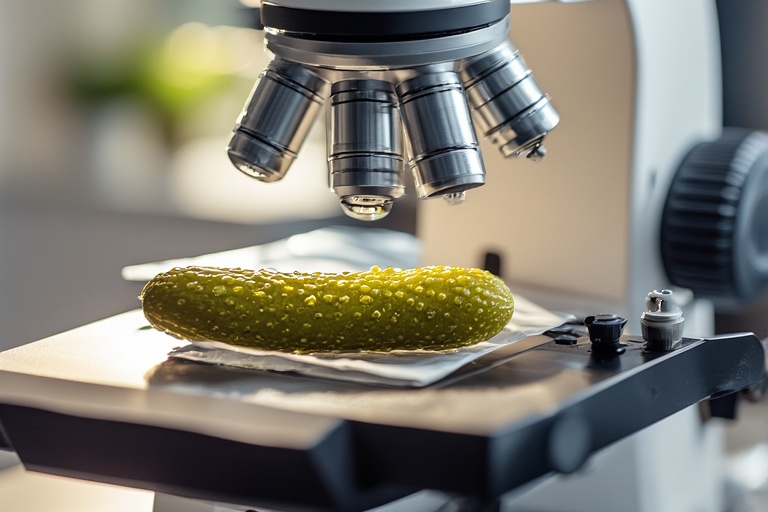
The Pickle Question
A long-overdue psychological–culinary keynote address
Ladies and gentlemen, esteemed non‑clinicians: the Pickle Question is no mere matter of garnish. It is a culinary core issue of near‑constitutional significance. We are not speaking of decoration; we are speaking of the structural integrity of an entire category of dishes.
The humble gherkin – Cucumis sativus var. cornichon – traditionally appears in finely diced cubes, preserved in vinegar, serving as the deliberate fault line in the otherwise monotonous landscape of pasta salad. It is symbol and bone of contention, dinner‑table diplomat and cause of divorce, all in one crisp manifestation.
The pro‑gherkin faction stresses the invigorating contrast in texture and cites historical precedents: from raucous wedding‑eve parties in Westphalia to cabinet consultations in Berlin – wherever gherkins were present, proceedings are said to have been “more dynamic.” The anti‑gherkin camp, by contrast, regards the vinegary cube as the proverbial grit in the gears, disturbing the delicate equilibrium of mayo and macaroni.
And now to the explosive scientific discovery dividing our nation: a recently published longitudinal study found that committed gherkin‑eaters, on average, could resist a box of domino‑sweets for a full seven seconds longer before giving in. The anti‑gherkin camp, however, showed significantly higher tendencies toward immediate consumption. Researchers now speak of the “Cornichon Coefficient of Delayed Gratification” – an indicator that has, quite rightly, already found its way into HR development and consumer research.
It must therefore be clarified, once and for all, whether in light of these findings the psychoactive pickled cucumber is to be classified as a medicinal product under prescription law, or whether it may continue to be dispensed freely by non‑clinicians. I advocate for a modest transitional period of general availability, provided that consumption is not primarily undertaken with therapeutic intent. Pickle on prescription? Or merely pharmacy‑only? The legislature must not kick the healing‑pickle question into the long grass.
Whether the above study will find further confirmation will be determined, not least, by the emerging field of evidence‑based gastronomy. That is why I repeat my call upon the government to substantially increase funding for clinical trials in the area of pH‑reduced cucurbits: pickles need peer review, double‑blind protocols, and at long last, clinical efficacy studies. Placebo comparisons are now finally meaningful, thanks to a specially bred dwarf zucchini. Germany must not fall behind in the international race for pickle‑efficacy research.
Until then, my interim directive is as follows: gherkins are to remain generally permitted until final clarification in Berlin, provided they enhance the sensory balance of the salad and are dispensed without therapeutic promises.
So do not simply eat at random – eat evidence‑based! – I thank you.
Publications The Conversation Contact Main Page
Publication Details
- Author: Meisters, K.-H.
- APA Citation: Meisters, K.-H. (2025, September 28). The Pickle Question. Retrieved from https://k-meisters.de/en/texte/text-071.html
- First published: September 28, 2025
- Last modified: September 28, 2025
- License & Rights: © 2025 Meisters, K.-H. – All rights reserved
- Contact for licensing inquiries: licensing@k-meisters.de
Impressum (German) | Impressum (English translation) | Datenschutzerklärung (Privacy Policy, German) | Privacy Policy (English translation) | Contact
Important Notice: I, Karl‑Heinz Meisters, am a graduate psychologist. My work is limited to conversations intended for personal development and clarification. I am not a physician, alternative practitioner, or psychotherapist, and I do not practise medicine as defined by applicable health‑care laws. I do not provide diagnoses, treat or alleviate illnesses, or offer medical services. My work does not include legal advice and is neither to be understood in the legal sense nor as a legal service.
K-meisters.de is my sole online presence. No additional digital profiles or social‑media accounts exist or are planned.
Talks and formats are offered exclusively in closed, non‑public circles.
Definition of “Private Guest”: The term “private guest” is used here in a non‑legal sense, referring to individuals who engage in preliminary conversations without any contractual relationship.
Definition of “Engagement”: Within the scope of my psychological consulting, the term “engagement” refers to a formal agreement to work together. This applies equally to related expressions such as “advisory engagement” or “engaged client.” My services do not include legal advice and are not to be interpreted as a legal service.
Image Credit: The images on this page were created with the assistance of artificial intelligence (Stable Diffusion via Perchance.org – https://perchance.org/ai-text-to-image-generator). They are subject to the Stability AI Community License – https://stability.ai/license – and are used in accordance with its terms. The images are for illustrative purposes only and do not depict any real person, brand, or protected work. Exceptions, where applicable, are noted below this paragraph.
© 2025 Karl‑Heinz Meisters – All rights reserved. All content, text, and concepts are protected by copyright. The communication concept presented here has been published by me as a structured work and is subject to copyright law. Any use, reproduction, or exploitation is permitted only with my prior written consent.